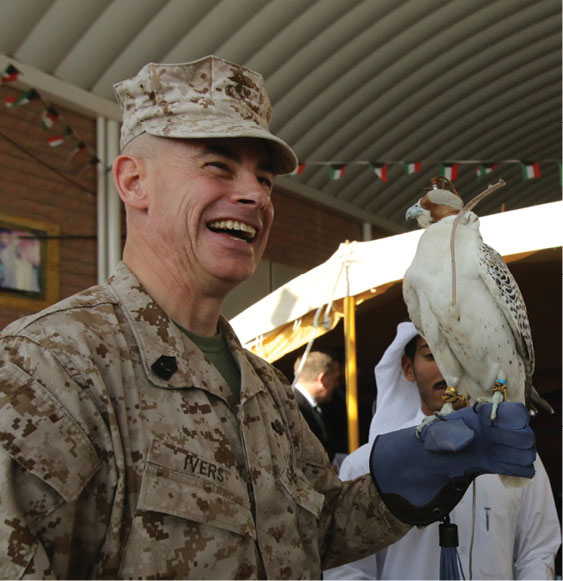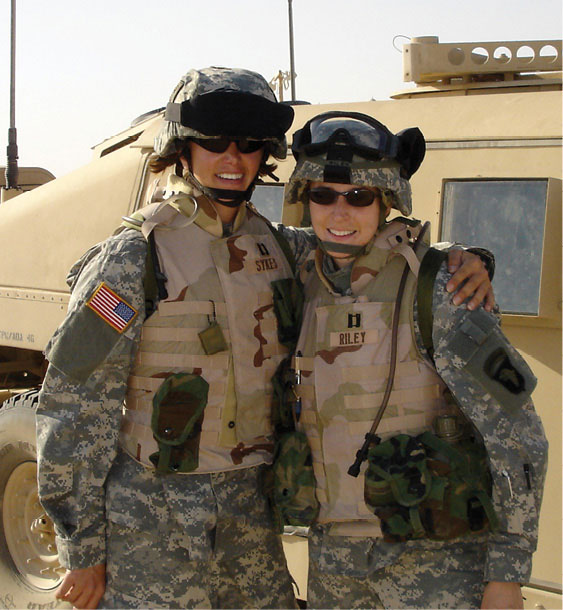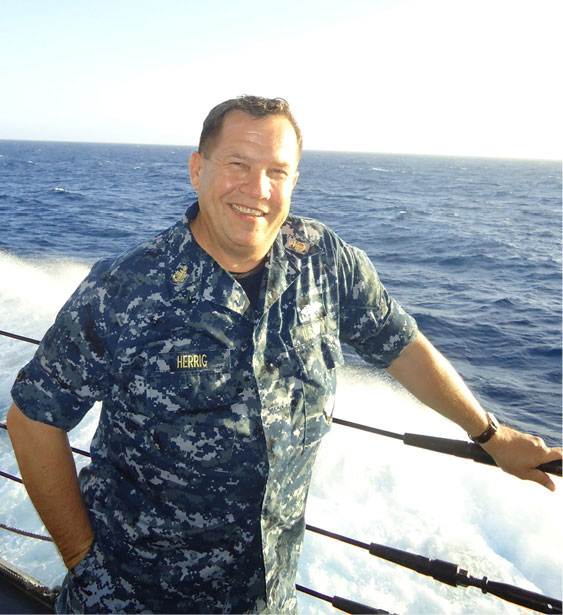Marine Master Gunnery Sgt. Brian Ivers, 52, Enlisted 1989
You can’t get much more American than John Wayne, can you? I was born in Melbourne, Australia, and my dad loved Wayne. One movie, Sands of Iwo Jima, has real war footage spliced in. Wayne plays a Marine whose wife has left him. I remember being a kid and watching him fighting and trying to reach the top of Mount Suribachi, but before they reach the top, he’s killed. His men keep going and later read a letter Wayne meant for his son, and you see the American flag go up. You can’t beat that. So I wanted to be a Marine.

U.S. MARINE CORPS/PHOTO BY SGT. RICH HURTADO/RELEASED
Related: 3 Ways to Discover Your True Passion
My family understood that I still loved Australia. Australia is a great country, but they still kneel to a queen. I wanted to be somewhere where my kids could grow up free. The best thing I’ve ever given my kids was American citizenship.
I spent a year in high school studying in the United States right outside of Fort Carson, Colorado. They wouldn’t take me without a green card. The Army ROTC told me that if I did four years with them, I’d be a resident, so off I went. It took a while, but I enlisted in the Marine Corps in 1989.
“The only green card I had that meant anything said ‘United States Marine Corps’ on it. The rest could go to hell.”
At that time, Congress had closed a lot of loopholes to immigrants, and I wasn’t a U.S. citizen. So I’m finally a Marine, the first Gulf War has started, and I’m about to cross the line of departure, and I get a letter from the government telling me I wasn’t legal. I had to leave. The Marine lawyers told me I didn’t have to go into combat. I sent immigration a reply: Here are my coordinates. Come and get me. The only green card I had that meant anything said ‘United States Marine Corps’ on it. The rest could go to hell.
We’d march for days, dig holes and sweep for mines. It was wet and black and raining oil. But those men were inspiring. I watched a kid pull a trolley through a minefield that hadn’t been cleared, under fire, everyone else lying down, just because it was something that had to be done. By the time we got to the enemy, we found a lot of them were completely done in. They couldn’t move or retreat, and they were cold and miserable. We’d take happy prisoners every 10 or 12 miles.
It got to the point where we just couldn’t carry everything there was to collect. I’ve never seen a Marine leave food behind, but I saw those Marines throw chow in the sand. It was too heavy.
After training, you don’t think about danger. The only time I’d think of death was when the ground shook and you’d see millions of fluorescent droplets exploding in the air. That’s the sign of artillery that blows up above you and sucks up all of the oxygen, causing an implosion. It literally rips the body to pieces. You can see raw bits everywhere. It’s like walking into a butcher’s yard.
When the war ended, there were Iraqi soldiers who didn’t want to give up. We’d just lie down in an airfield, with our ponchos over ourselves in the rain, having been told the people around us had surrendered. Then they shot at us. Out of nowhere, this AH-1 helicopter comes swooping down, and a man steps out with a mini-14 gun and asks, “Where is it coming from, son?” I pointed, and he went and flattened them. Very John Wayne.
I keep coming back to him because that’s the quintessential American. Wayne would say ‘saddle up’ in his movies, and that’s what I say when I lead. Marines will do anything. If you make a bad decision, they will still follow you. I’ve seen them being overrun and fixing bayonets, knowing they were going to die, because that’s what they are supposed to do.
I earned my citizenship after Kuwait. Serving in wartime means they expedite your application process.
I’ve had nine more deployments since, and I’ve been in combat six times. I won’t go again. I’m going to be 52 this year. My body is breaking down. I’ll stay involved somehow. There are programs like Marine For Life, and I do public speaking. I won’t miss the organizational bureaucracy. I’ll miss my Marines. I’ve done everything that’s fun. Everything else is just sitting behind a desk.
Related: 4 Simple Steps to Live Your Dreams
Army Maj. Sarah Sykes, 40, Enlisted 2005
There is no good-sense reason why I joined. My background was legal. I was clerking at a small firm and spent a summer at a correctional facility for juvenile boys, and I fell in love with the little gangbangers. I wanted to make things better for them. My goal was to get a degree and become a warden so I could improve some of the horrific conditions I saw. Then during my first year of law school: 9/11.

SFC JEREMY BAILEY, USA, RETIRED
There is a super-cheesy, flag-waving patriot inside of me. My dad served, my mom’s dad served, we had family in West Point and I just thought, This is what you do as an American. Everyone gives back. I didn’t know what the Army did with lawyers, but I thought it must have something for me.
My dad was against it. He told me the Army needs people who can take orders.
At the time, I had two children as a single mom. My daughter was almost 1 and my son was 5. My brother was already an infantry officer deployed at the same time as me, and my mom moved up to Fort Campbell to take care of the kids. I made videos of myself doing all sorts of normal stuff like brushing their hair, cleaning their teeth, cooking their dinner, just for them to watch every day and remember me.
I was deployed to Iraq in 2005 as a Brigade Judge Advocate. I oversaw investigations and prosecuted some cases. If a local had his or her property damaged, I made sure the person got money for their claims. I spent a lot of time on mail. Stealing mail is a huge problem there. It takes forever to get anything, so if there are packages missing it’s demoralizing. Soldiers’ families would send them packages and then email them asking if they got everything, and only then did they find out stuff was missing. When it’s your lifeline, it matters a lot.
I also worked as a defense counsel for three years and a special victim prosecutor. There were six of us trying special cases on sexual assault and homicide. The interesting cases are the most emotional ones, especially in the military where everyone is supposed to be a big family.
I met my husband on deployment. He was a commander, and we were friends for years before we got together. You don’t have a lot of downtime, but when we were hanging out in a tent playing cards I could tell he was a solid dude. When our deployment ended, we were both at Fort Campbell and things fell into place.
We have trouble staying together. He’s been deployed six times. We’re both at Fort Bragg and it’s the first time we’ve been stationed in the same place in six years. My daughter still has a nuclear meltdown whenever we have to move. Sometimes I feel bad. We’re not a normal family, but that’s the only way of life my kids know. Sometimes I say to myself, My God, look at the choices you’ve made. I try to remember every lifestyle has challenges.
Related: We All Have 2 Choices in Life…
I leave the service this summer. I’m lucky. My brother saw his best friend killed. He started traveling with his friend’s tennis shoes, taking pictures with them in different countries and sending them back to his friend’s mom to show he cared. The Department of Veterans Affairs finally got him in a good treatment program, and he’s pulled himself together. But he had a drug and alcohol problem after that for a long time. He was in no condition to stay in the Army.
When you think about the Army, you think about these hard men kicking in doors, shooting everything, but there’s more to it than that. And, sweet mother of God, if you’re a lawyer, you’ll end up defending all of it.
Navy Sr. Chief Jon Herrig, 55, Ship’s Serviceman Senior Chief, Seabee Combat Warfare. Retired, Enlisted 1980.
My nephew called me several years ago to tell me he was considering the Marines. This was right after breaking up with his girlfriend, so I thought he might not be joining for the right reasons.

COURTESY OF SHCS (SCW) JON A. HERRIG, USN
I go to his house and ask, “Why the Marines?” He says it’s because that’s where the action is. I explained to him, the action you see is not a video game. It’s an improvised explosive device attack or insurgents.
I joined the Navy completely acting on impulse. I was 19, six months out of high school, and I’d just had a big fight and moved out of my parents’ house. It was some dumb thing, one of my sisters said something about my girlfriend, and I spouted off babbling some defense and moved in with a friend for three weeks. I talked it through with my friend, and we thought the Navy would be fun. We laughed about that later in boot camp.
My dad was supportive when I told him. He just asked that I move back in before I left.
A week after moving back in, I leave. The first four years, I was on the USS Coronado and the USS Fulton visiting the Persian Gulf. It was the longest I’d ever been away from home in Dubuque, Iowa. I started making friends, and the homesick feeling went away.
Mostly, my deployments were on the good side. The gravest challenge was always just getting the right mindset. Once you get that down, everything in your personal life is reflected in your military life.
There were terrifying moments. I was in Iraq in April 2012 doing an inspection of their army. This was a few months after the U.S. formally declared an end to the war. It was common for our convoys to have an interpreter escort lead the way. Ours led us right into an ambush. Most interpreters live off base, so you have to be careful with them. At any point an interpreter’s family could be kidnapped, forcing him into a situation where he has to help the enemy kill us or lose his own family. I don’t know what happened to ours.
The first vehicle in our convoy was hit with an IED. Then one hit the second, which I was in. The armor did its job. What stays with you is the sound, the concussive force of the explosion. That sound feels so close.
“Bottom line: There will always be good deployments and bad ones. It’s about the people you serve with, the brothers and sisters you make along the way, who support you through the challenging times.”
My nephew ended up joining the Army. He’s already finished a tour of Afghanistan. He lost three soldiers—three brothers—to an IED attack. He had to recover the bodies. I was so fortunate that I never dealt with that, but it was always in the back of my mind. Bottom line: There will always be good deployments and bad ones. It’s about the people you serve with, the brothers and sisters you make along the way, who support you through the challenging times.
Related: Why You Need Positive People in Your Life
As told to Peter Rugg
This article originally appeared in the October 2016 issue of SUCCESS magazine.




